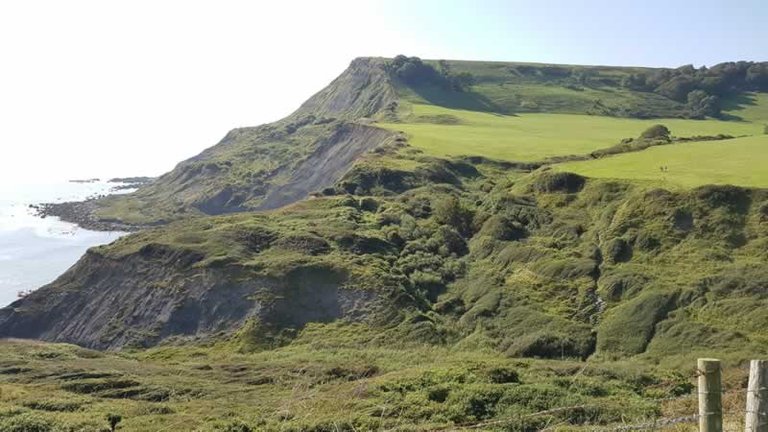
As a boy my fondest memories are of the great many weekends spent exploring the small inlets and coves on the Isle of Purbeck in Dorset. My father was a keen spear fisherman, which in the mind of any self-respecting sea bass, translates to a foreboding, predatory, psychopath. His metre long Mares compressed air spear gun was adjusted for maximum impact as he gently maneuvered around the rocks and clay shelves that lay just beneath the turning tide, to catch the fish as they were feeding.
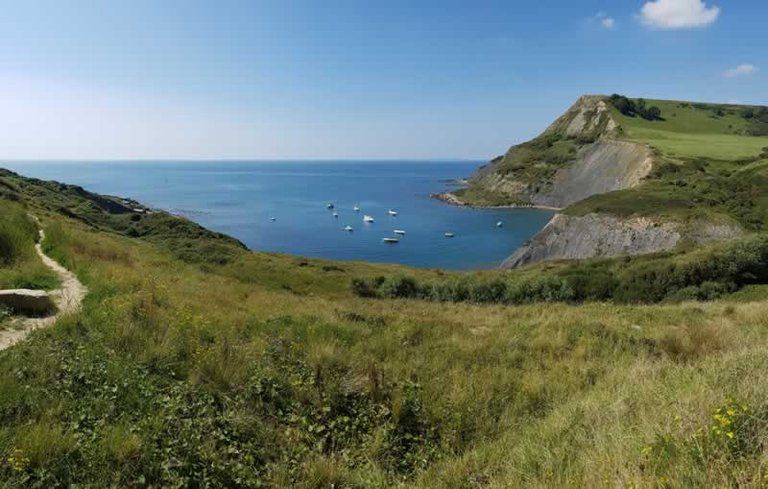
Our favourite cove was tucked in beneath St Aldhems Head, straight out from the village of Worth Matravers, called Chapmans Pool. We would park up at Renscombe Farm and walk down the valley towards the cove. As a youngster I had two dogs, a short-haired border collie called Tyke who was trained well but ridiculously over excitable. His zest for life explicitly demonstrated by sprinting off down the grassy banked valley to chase cows up the hill circumnavigating them and barking with delight as if they were old acquaintances in the school playground. Tyke would be so overwrought with excitement, he would take himself off ahead in search of more sociable souls to jump up at yapping like a delirious fool. The other dog, Bess, was a collie cross labrador with the complete opposite nature. Bess wouldn't stray more than ten metres away all the while looking over her shoulder to check we hadn't slipped off the vertical bank into the brambly abyss.
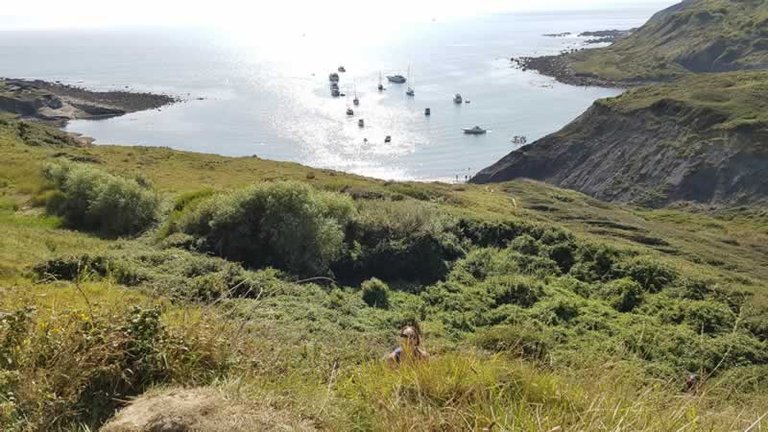
On a warm spring or summers day, this walk to the beach encapsulated the word idyllic. The birds sang and danced about the wilderness as the dirt track cut through the middle of one side of the valley. Looking up, the grassy bank was high and steep with cows strewn around contemplating their next methane emission. For the first half of the walk, there was no passage down. The higher part of the valley was knotted with creepers, brambles and blackberry bushes. The only pathways off the main track were slight with small hoof or paw like impressions in the muddy ground. As we reached halfway the intense aromas and rich colourings of wild shrubs and bushes gave way to a more open expanse of collapsed muddy clay cliffs reaching to the sea. The steep grassy bank now replaced with a sheer drop from the top of the headland where rocky outcrops sat obstinately waiting their own demise. Looking down to the right the contours of the cove were now becoming apparent along with the general stillness in the landscape. Chapmans Pool sits nestled in tight down the side of St Aldhem's Head.
The curving shape of the bay as it comes into view, has been carved by the movement of the sea, first through the hard limestone and then more voraciously through the crumbling clay. On a hot summer say, arriving at low tide, the bay glistens with rock-pooling opportunities, as it’s teasing underbelly of life is exposed and vulnerable. At high tide, the water moves in encroaching on the roughshod shoreline, providing cover for all the critters, exhausted from hours of dodging our inquisitive nets and crab hooks. Despite the constant erosion and visible evidence of cliff fall, these trips to the remote beauty of the Purbeck’s have provided me with an unceasing sense of inner-peace that is like a life long refuge in the mind.
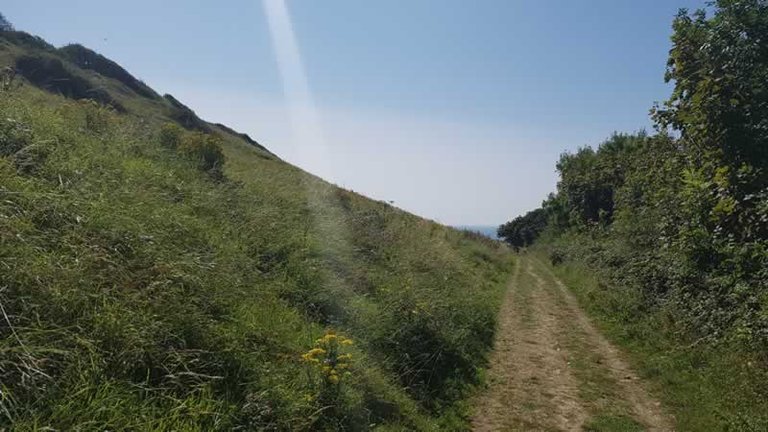
The downward path to the beach kept going and followed the curve of the geological mass upwards over another great big thrust of a hill towards Kimmeridge Bay, Durdle Door and lots of other coastal treasures, marked along the ridge by the familiar posts of the South West Coastal Path.
The summers were memorable for snorkelling with a crab hook looking around the rocks and ledges, sneaking up on fish and then watching them dash for cover when they detected my pale frame of flesh hovering over them. Outside of the water I join the craggy tributary of the Coastal Path and run with the dogs, following it up the narrow winding unsteady cut in the gorse bushes that were often double overhead. Dad would often be in the water for two or three hours so amusing ourselves was the order of the day. The dogs loved to gambol over distances so up we went at high speed towards the point where our thorny track joined up with the main path, that then directed us almost vertically towards the top of St Aldhems Head. Nearing the top with jelly legs, the dramatic edging of the Isle of Purbeck coast can be seen from a great vantage point. The big boulders collapsing off the face of the cliffs are scattered about like giant lego pieces to be clambered over and marveled at. Here are the top there is also a thousand year old Norman chapel. Tiny in size but somewhat stoical in its clinging to this patch of cliff. The chapel is set in front of a tiny row of cottages that stretch backward with a lonesome feel. After a rudimentary gander about the place to check all was as it should be, it was time to head back. The descent was rapid and the dogs, panting hard, would be nosediving to the bottom of the main hill, from where we take an altered route down to the beach and spend a slower time jumping over rocks and inspecting the tidal line, where all manner of intriguing rubbish is dumped.
Chapmans Pool had a second name that it was given by smugglers from days of old. 'Dead Mans Fingers' was so named because of the treachery of the rocks and ledges that lie unseen beneath the surface of the sea. It was these ledges that one stormy evening forced a ship laden with men and gold to wreck at the entrance of the cove. The gold and the men were all lost to the sea and rocks and it was my lingering wish that I would happen upon a sum of this treasure one day, on my wonderings across the rocks. I had, on my first contemplation of this scenario, accepted the fact that any booty may have to be separated from the skeletal grasp of some long extinct mariner; a thought that added a little edge to the adventure.
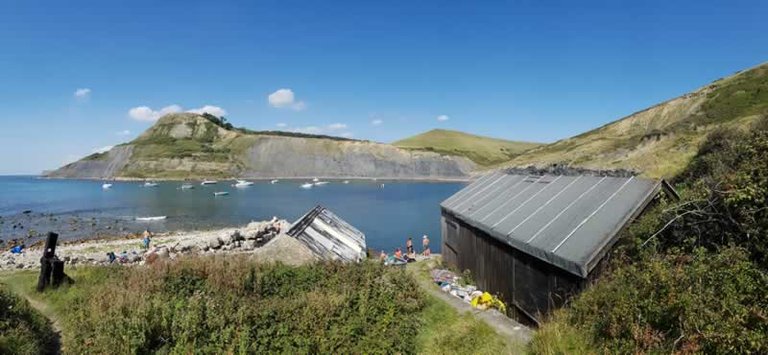
It was in the wintery months that these trips proved more challenging. The area was often sodden with rain and icy run-off water from the land. The sea would be wilder and temperature around zero. I recall one year near Christmas time clambering over the rocks with my friend Mike. Dad was now out of the sea and warming himself next to a large fire he had built between some rocks on a large flat wooden platform constructed out of the driftwood. The fire was large, reaching about six feet into the air, boosted by the late addition of a thick length of rope coated in tar. Mike and I had spied a recently collapsed clay cliff and so made our way over to it. The objective was to try and sift through the small pieces of clay and pick out fossils. This had been one of my favoured activities, taking them home and varnishing them before presenting the shiny fossils to my friends at school. As we climbed up into the wreckage we saw a few hopeful specks of white that usually meant fossilised organic matter. The trouble was that the clay was very wet and soft, so in no time, we were both sunk in up to our thighs and unable to extricate ourselves. I screamed over to the elders for help and they appeared some metres away to inspect the dilemma. My fathers initial response was, “You must be joking? I'm not getting all that mud on me after drying off.” He then shot an angry look for supposing that it should even be considered. Then, thinking some more, he relented and edged closer. “Give me your hand..” he commanded, “Right, now I am going to pull you out from here. Don't lose your wellingtons whatever you do or you’ll have to walk back with bare frozen feet!” Eventually I was out with numb feet, stretched spinal vertebrae and covered in muddy clay. Mike was next. He was actually blue with cold and had frozen tears on his face. He was extricated in a less than graceful way and deposited on a nearby rock whimpering in the freezing cold wind that was cutting through us.
I would have scoffed at his display had I not been issued my next instruction from the old man: “Now take those muddy clothes off and go in the sea to wash yourself. You are not coming near the fire looking like that!” My response was to immediately join Mike in a mutual state of whimpering. The sea was bitter cold and bit into the skin like lashes from a cat of nine tails. When I came out I could barely walk. In the mode of a depressed, defeated, ill begotten sea bass, i willed myself towards the fire and was given a space, almost out of range of the heat, where I could dry off and try to regain some natural colour. Father sat there resolute andfrom the corner of my eye, I could see Mike was entertaining dark thoughts about humanity!
Being a boy without necessary means, getting my own back was never really on the agenda but fate did indulge me somewhat with a scene that caused me so much laughter, and my father enough humiliation, that I felt the scales were comfortably balanced.
As a spear fisherman your prowess has several points of measurement. The first is the strength and power of of your gun. Compressed air guns are better as they release the spear with explosive force. Dad had imported his gun from Italy and it was particularly sinister looking. Another is the ability to spear big fish. This goes without saying but is harder to achieve than one might think, thus making way for the third requisite: the ability to talk about the “one that got away”. This elusive fish is generally always three times the size of any other actually landed and, was so close that, respect ought to be given for the effort involved in telling the story.
It was with the tools, the tales and the enthusiasm to be manly that my father had decided that he would go in at Chapman's Pool in the dead of night, on the turn of the tide when the larger fish would be feeding and he could puncture the middle of one of these larger beasts, dragging it ashore for us to spit roast over our fire. Thus we set up camp and brought provisions. The tents were pitched on the softer ground behind the fisherman's huts and we created a circle for the fire and then relaxed as the evening sun went down. The idea was for Dad to take to the water when the tide was about half way in, meaning the fish would be going with the tide and feeding around the covered rocks that cover the seabed to one side of the cove.
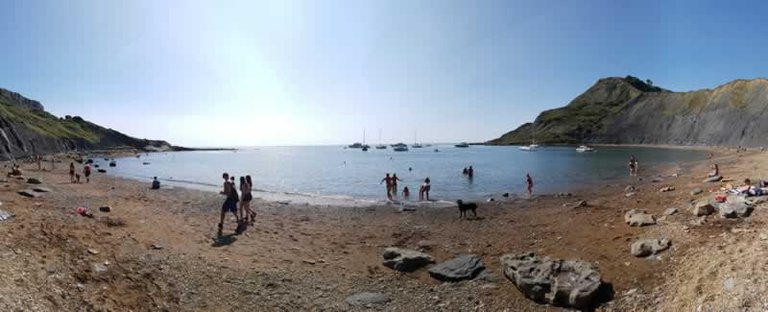
Suited up in a semidry wetsuit with goggles and snorkel, he sat at the waters edge, gently lit by the flickering fire. On one side lay an enormous torch blasting out a powerful beam and to the other the metre long speargun. Once the spear was loaded into the barrel, Dad sat down and started easing on his flippers. This was followed by spittle added to the goggles with a seawater rinse to stop them misting up and, with all the apparatus was attached in all the correct places, he pushed off into the water, a little more noisily than a marginally rotund sea lion.
I sat on the beach and watched as the beam from the torch stretched out under the water. His legs moved, tapping his large flippers on the surface, causing ripples and propelling himself gently from the shallows where the light exposed submerged rocks about half a metre down. His breathing through the snorkel was certainly audible, as it was amplified by the tube. The initial burst of rapid breathing subsided into a more rhythmical pattern and he floated steadily towards the deeper waters. The night was not entirely dark as I had the fire, the stars and a crescent moon supplying ambient lighting.
The first signal of alarm was detected in a stiff increase in the sound of breathing. Something in dark waters had stirred the old boy into a state of alarm. I jumped up to see what the fuss was but he appeared to be completely still. The sight and sound were at odds for a moment until all of a sudden he burst out of the water and with no care for its depth started a running scramble for the shore. His face, lit by the fire, was contorted and puce in anguish, reminding me now of one of those screaming popes seen in the paintings of Francis Bacon. Running through, over and out of water, with flippers on, is not a half hearted task. The massive sea lion that sped passed me was certainly committed. From way up the beach he sat facing the sea, panting in shock, with the gun pointed upwards and the torch dumped by sea edge.
“What happened Dad?” I asked curiously.
He pulled off his mask and took a large deep breath. Then placing the gun down he held up both hands to imply a very large circle and said between gasps, “A bloody huge conger!”
Conger eels are truly the most feared creatures that I know of in English waters. Their canine like heads resemble my dog, Tyke's, head rather than anything else in the sea. Their big bulging eyes and wide mouth are distinctive trademarks. The most feared aspect of the conger though, is the sharp angular interlocking teeth that point backwards and, once locked on their prey, cannot release until the matter has been resolved (or dissolved as the case maybe!). What became apparent was that the old man had been edging out of the shallows as I had watched. Shining the light into some weeds he caught the reflection of a pair of eyes looking back. Feeling emboldened by the size and strength of his weapon he decided to investigate further and reached down, prodding the creature on the nose. This prompted the head to emerge slightly from the weeds below, stopping a little closer and, in so doing, revealing the true size of the beast. The head was indeed bigger than Tyke's and the body was probably around two metres long. Even if he speared the creature between the eyes, the chance are that he could be injured by its tossing and flipping in anguish. The short pause for decision yielded only one course of action: runaway!
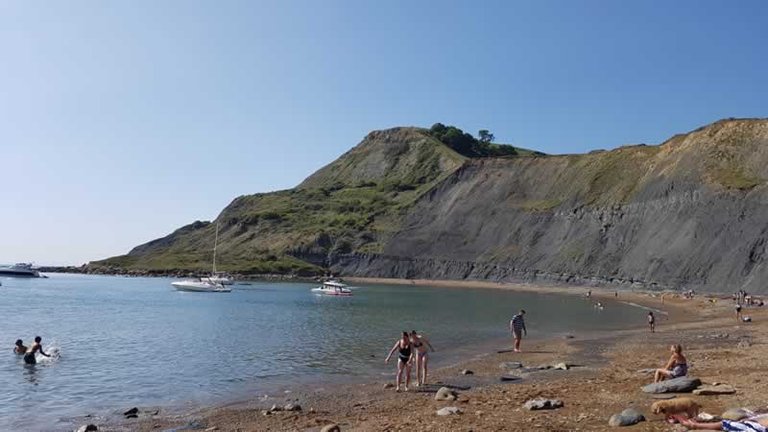
In later life and right up to this day, it is the landscape of the walks and coves, cliffs and beaches along the Isle of Purbeck that furnish my dreams and are associated with a time of carefree peace and adventure. I guess that is the essence of my childhood that I recall, or at least, like to recall. It is also a part of my experience that I would like to pass on to my own children, should I ever have any to bring up.
Very well done. Thank you for the sharing :) Followed you.